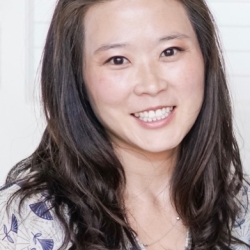
Jae H. Paik
More Contact Information
Lab: EP 209
Lab Phone: (415) 405-0555
Lab Website: https://globalclassroom.sfsu.edu
Research Interests
Dr. Paik received her Ph.D. in developmental psychology and cognitive science from Indiana University in 2005. Her research focuses on the development of early mathematical concepts, comparison processes, verb acquisitions and social cognition. She is particularly interested in the intricate relations between language, culture, and conceptual development. She is currently conducting various cross-cultural studies examining U.S., Chinese, French, Korean, and Singaporean children’s cognitive development.
Representative Publications (* = Indicates a Student Author)
Clerc, J., Leclercq, M., Paik, J.H., & Miller, P. (2021). Cognitive Flexibility and Strategy Training allow Young children to Overcome Transfer-Utilization Deficiencies, Cognitive Development, 57.
Childers, J.B., Paik, J.H., Flores, M.*, Lai, G.*, & Dolan, M.* (2017). Does Variability Across Events Affect Verb Learning in English, Mandarin, and Korean? Cognitive Science, 41, 808-830.
Duh, S.*, Paik, J.H., Miller, P.H., Gluck, S.C.*, Li, H. * Himelfarb, I. (2016). Theory of Mind and Executive Function in Chinese Preschool Children, Developmental Psychology, 52(4), 582-591.
Shimpi, P., Paik, J.H., Johnson, R.*, Wanerman, T. & Duh, S.* (2015). Using Parent and Teacher Voices in the Creation of a Western-Based Early Childhood English-Language Program in Chengdu. Journal of Research in Childhood Education, 29, 1-17.
Rodriguez, R., Paik, J.H., Duh, S.* & Li, H. (2013). Relations between Socio-Emotional and Cognitive Development in Middle Childhood: Findings from Chinese Elementary Students. Journal of World Education Special Issue, 31-34.
Yoon, I., Puder, A., Ng, G.*, Thakur, M., Rodrigues, H., Paik, J.H., & Kang, E.Y. (2013). Educational MMORPG for Computer Science: DeBugger, a Virtual Lab on PC and Smart Phones. Proceedings of the International Workshop on Distance Education Technologies. ACM, New York, NY, 96-101.
Yoon, I., Ng, G., Rodrigues, H., Nguyen, T.*, Paik, J.H., Yoon, S., Williams, R., Martinez, N. (2013). Iterative Design and Development of the “World of Balance” Game: From Ecosystem Education to Scientific Discovery. Proceedings of the IEEE International Games Innovation Conference (IGIC). IGIC, New York, NY, 283-290.
Courey, S. J., Siker, J., Paik, J. H., & Balogh, E.L. (2012). Academic Music: Understanding Basic Fraction Concepts Through Music Notation. Educational Studies in Mathematics, 81(2), 151-178.
Paik, J.H., Gelderen, L.*, Gonzales, M.* & Jong, P.F. (2011). Cross-Cultural Differences in Early Math Skills Among the U.S., Taiwanese, Dutch and Peruvian Preschoolers, International Journal of Early Years, 19(1), 1-11.
Paik, J. H., Luong, H. N., & Morsella, E. (2011). Giving children a prefrontal cortex? Increased mental control through external cues. The Psychology of Self-Control. New York: Nova Publishers.
Paik, J.H., Gelderen, L.*, Gonzales, M.* & Jong, P.F. (2011). Cross-Cultural Differences in Early Math Skills Among the U.S., Taiwanese, Dutch and Peruvian Preschoolers. International Journal of Early Years Education.
Gonzales, M.* & Paik, J. H. (2010). Cross-Cultural Difference in Preschool Teacher’s Teaching Style and Math Instruction. International Journal of Learning, 17(10), 251-264.
Childers, J. and Paik, J.H. (2009). Korean- And English-Speaking Children’s Use Comparison in Verb Learning. Journal of Child Language, 36, 201-221.
Paik, J. H. & Mix, K.S. (2008). It’s All Relative: Different Levels of Relational Similarity Used in Children’s Comparisons. British Journal of Developmental Psychology, 26, 495-505.
Mix, K.S. & Paik, J.H. (2008). Do Korean and Fraction Names Promote Part-Whole Reasoning? Journal of Cognition and Development, 9(2), 145-170.
Paik, J.H. & Mix, K.S. (2006). Preschooler’s Use of Surface Similarity in Object Comparisons: Taking Context into Account. Journal of Experimental Child Psychology, 95(3), 194-214.
Paik, J.H. & Mix, K.S. (2003). U.S. and Korean Children’s Comprehension of Fraction Names: A Re-Examination of Cross-National Differences. Child Development, 74, 144-154.
Information Related to International Programs and Projects
Psychology Faculty-Led Summer Study Abroad Program. This is an intensive 6-week program where Psychology students travel to China to be fully immersed in a social and cultural exchange while offering various psychological field services to Chinese children, family and teachers. Click here for more information about the program and to learn more about the application process for our upcoming trips. Click here for blogs from our first cohort of 14 psychology students.
Supporting Communities Impacted by COVID-19. Since Feburary 2020, psychology faculty have been sharing resourceful information (e.g., maintainng positive mental health and family dynamics) with international communicities impacted by COVID-19. Further, psychology students have created fun, activity videos that have been enjoyed by many young children. Click here to read more about the ongoing collaborations with Southwest University of Science and Technology (SWUST) in Sichuan Province, China.
Training in Psychology and Social Sciences from a Global Perspective.
Courses Taught
PSY432 Cognitive Development: Lang., Thinking and Perception
PSY431 Developmental Psychology
PSY330 Child Development
PSY730 Theories of Developmental Psychology
PSY735 Differences in Cognitive Development
PSY300 Contemporary Issues in Psychology
PSY305 Controversial Issues in Psychology (Intensive Writing Section)
PSY400 Introductory to Research Methods
PSY558/559 Field Service Seminar/Psychological Field Service
PSY699 COR Speakers Series Seminar
PSY770 Research Methods and Techniques